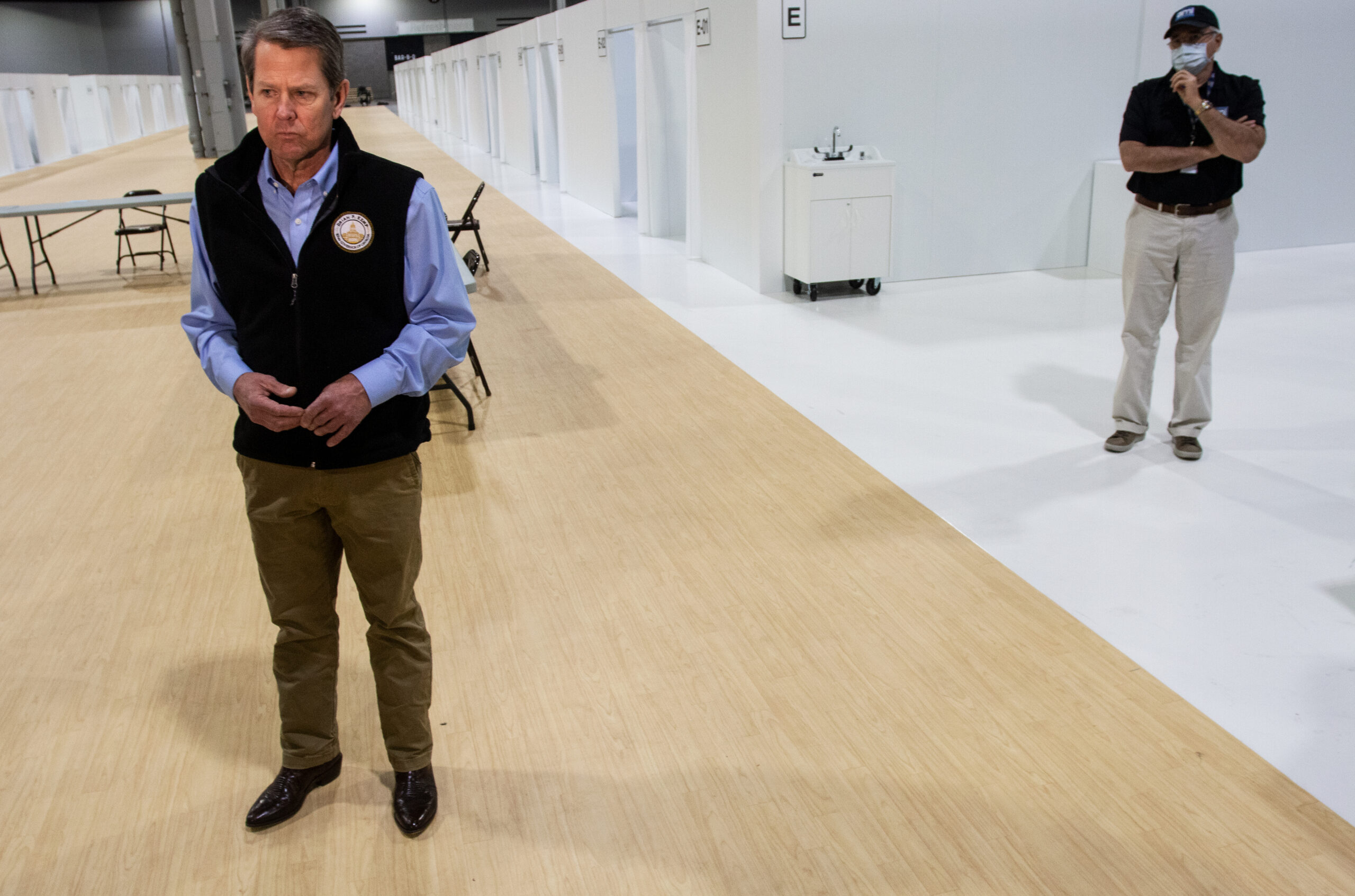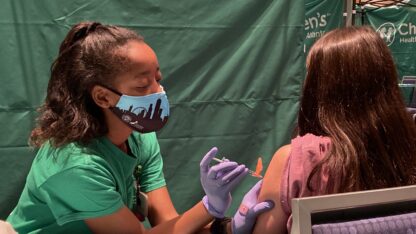All Eyes On Georgia As Kemp Plans Reopening Of Some Businesses

Georgia Gov. Brian Kemp announced plans to allow some shuttered businesses in the state to reopen as early as Friday.
Ron Harris, Pool / Associated Press
Gov. Brian Kemp announced Monday that certain businesses in Georgia will be able to reopen this Friday despite the ongoing COVID-19 threat.
The announcement puts the state in a national spotlight, signaling an unusually bold approach to resuming normal operations.
The businesses being allowed to reopen include gyms, fitness centers, bowling alleys, body art studios, barbers, cosmetologists, hair designers, and nail care artists.
Restaurant dining rooms and movie theaters can open next Monday under the Kemp plan, but bars, nightclubs and entertainment operations will remain closed for the time being. Public schools will stay shut for the rest of the school year.
And in good financial news for hospitals, elective surgeries that are deemed essential will be resumed.
Kemp referred to the White House Coronavirus Task Force guidelines in making his dramatic announcement at a press briefing in a plaza across the street from the state Capitol.
The Task Force guidelines, issued last week, outline the “reopening” criteria for states, including adequate COVID-19 testing, contact tracing, and health care capacity.
The guidance also says that before reopening, a state should have seen a decline in new COVID-19 cases for 14 days. That’s a criterion that Georgia has not yet met.
Other states in the Southeast are taking similar steps. South Carolina allowed retail shops to open Monday with social distancing guidelines, and the governor of Tennessee announced plans to ease restrictions.
An Optimistic Outlook
The governor pointed to recent positive developments in making his announcement.
“Reports of emergency room visits for flu-like illnesses are declining, documented COVID-19 cases have flattened and appear to be declining, and we have seen declining emergency room visits in general,’’ he told reporters. “By expanding our hospital bed capacity — including the temporary facility at the Georgia World Congress Center [in Atlanta] — we have the ability to treat patients without crisis care in hospital settings.’’
Reports of COVID-19 deaths in Georgia “have declined dramatically,’’ said Dr. Kathleen Toomey, Public Health commissioner. As a rolling total, she said, “we definitely have a plateauing’’ of cases.
Yet on Monday, Public Health reported an increase of 86 deaths since Sunday evening.
Medical experts, meanwhile, have said that testing for COVID-19 should be much broader than current levels before the nation can safely reopen.
New estimates by Harvard University researchers suggest that the United States cannot safely reopen unless it conducts more than three times the number of coronavirus tests it is currently administering over the next month. That level of testing is necessary to identify the majority of people who are infected and isolate them from people who are healthy, according to the researchers.
The country’s top infectious disease doctor, Anthony Fauci, warned during an interview Monday on ABC’s “Good Morning America” that reopening businesses too soon could “backfire.”
Governors from both parties said Sunday that a shortage of tests was among the most significant hurdles in the way of lifting restrictions in their states.
Kemp emphasized that COVID-19 testing will be ramped up in Georgia.
“For weeks, I have expressed my frustration with the status of testing and committed more resources to expansion,’’ Kemp said. He added that a broader partnership with Augusta University Health would “double down on our testing capacity and meet the requirements necessary to move forward with the president’s plan.’’
Georgia will maintain a 24/7 operations center on COVID-19 run out of Augusta University. Kemp encouraged Georgians with COVID-19 symptoms to download an app from the university and begin the screening process.
“This streamlined process reduces stress on both the patient and testing site workers,’’ Kemp said. “We will leverage the power of several key academic institutions in the state to process tests.’’
Augusta University will also produce much-needed testing swabs by using the same 3-D printers that have produced face shields for health care workers.
The Georgia National Guard will mobilize 10 new strike teams to deploy to hot spots and long-term care facilities to administer 1,500 tests per day.
“As I’ve said before, testing defines the battlefield and informs our long-term strategy,’’ Kemp said. “These efforts significantly increase our capacity as we take measured steps forward.”
Georgia’s rate of testing remains among the bottom 10 states, but Georgia National Guard Gen. Tom Carden said the state capacity is increasing.
Test Kits Still Hard To Get
The supply of test kits remains a problem, Carden said. “We don’t have as much as we want. It’s not easy to do coronavirus testing.’’
Kemp added that based on statements by Vice President Mike Pence, head of the White House task force, “I think the supplies are going to continue to loosen up.’’
He said that by having the testing swabs produced in Augusta, and not somewhere out of state, Georgia is taking “our destiny in our own hands.’’
Toomey emphasized the need for contact tracing of people who are infected. She said that volunteers, as well as Public Health staff, would be deployed to track the people who have come into contact with a patient. “This is the way we’re going to stop the virus,’’ she said.
Leading state Democrats criticized the Kemp decision. Atlanta Mayor Keisha Lance Bottoms told ABC News late Monday that she will urge residents to stay at home. “We don’t know what the governor is looking at, but what I do know is we have nearly 19,000 people who have tested positive as of this evening,” she said.
Businesses that are reopening will be subject to restrictions. Kemp said it won’t be “business as usual.’’ Each business will be subject to social distancing standards, screening workers for fever, and use of masks and gloves when appropriate. Businesses will have to follow the guidelines, or the state will take action, Kemp said.
The governor noted that hospitals, by halting elective surgery, were losing substantial amounts of money. Hospitals had to stop doing many such surgeries to conserve staff and personal protective equipment.
When he was asked about other states imposing a moratorium on evictions and foreclosures, Kemp said the idea had been brought up among his staff. “We’ll continue to consider that.’’
After the governor’s remarks, Lt. Gov. Geoff Duncan and Georgia House Speaker David Ralston, who like Kemp are both Republicans, spoke to reporters.
Ralston, of Blue Ridge, called the virus “a monster’’ that has “really changed lives for Georgians in ways we’ll never fully grasp.’’
He said Kemp, in his plan, is taking “measured, balanced steps’’ that will put people back to work.








